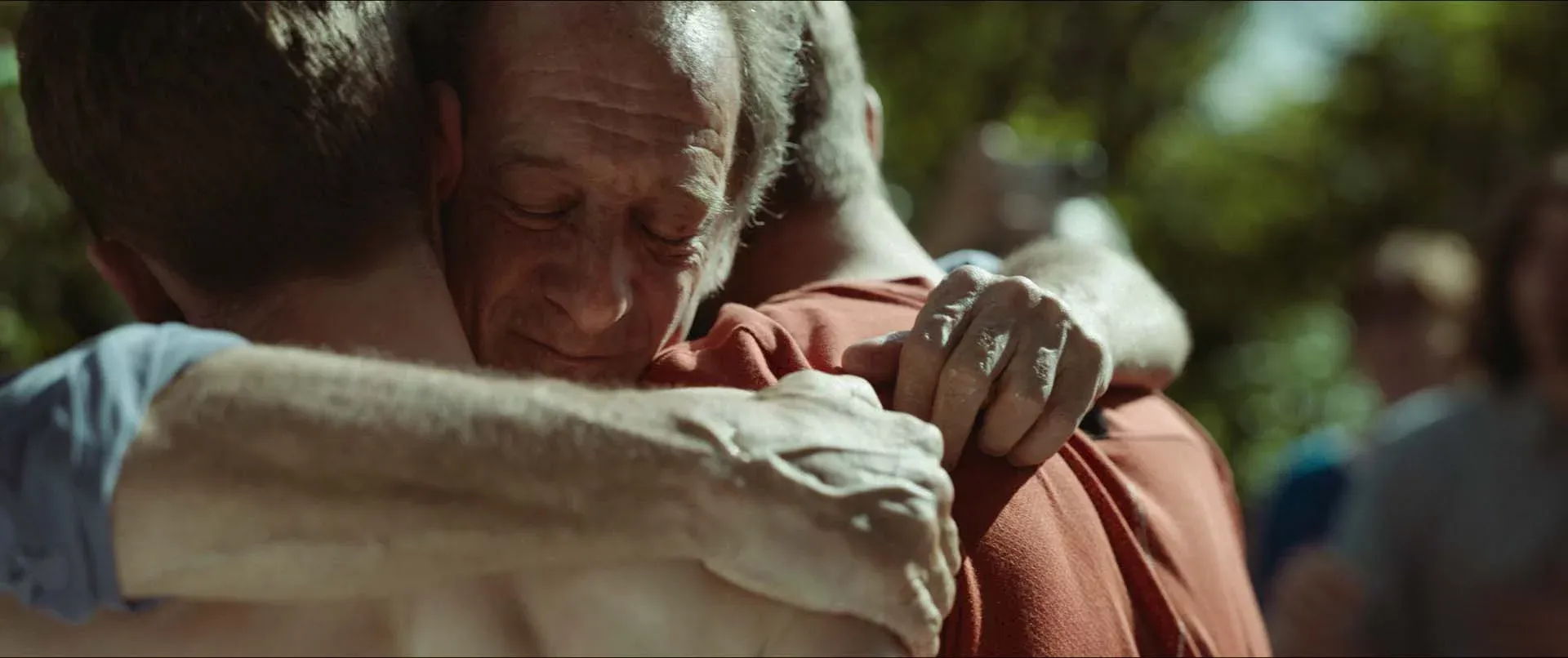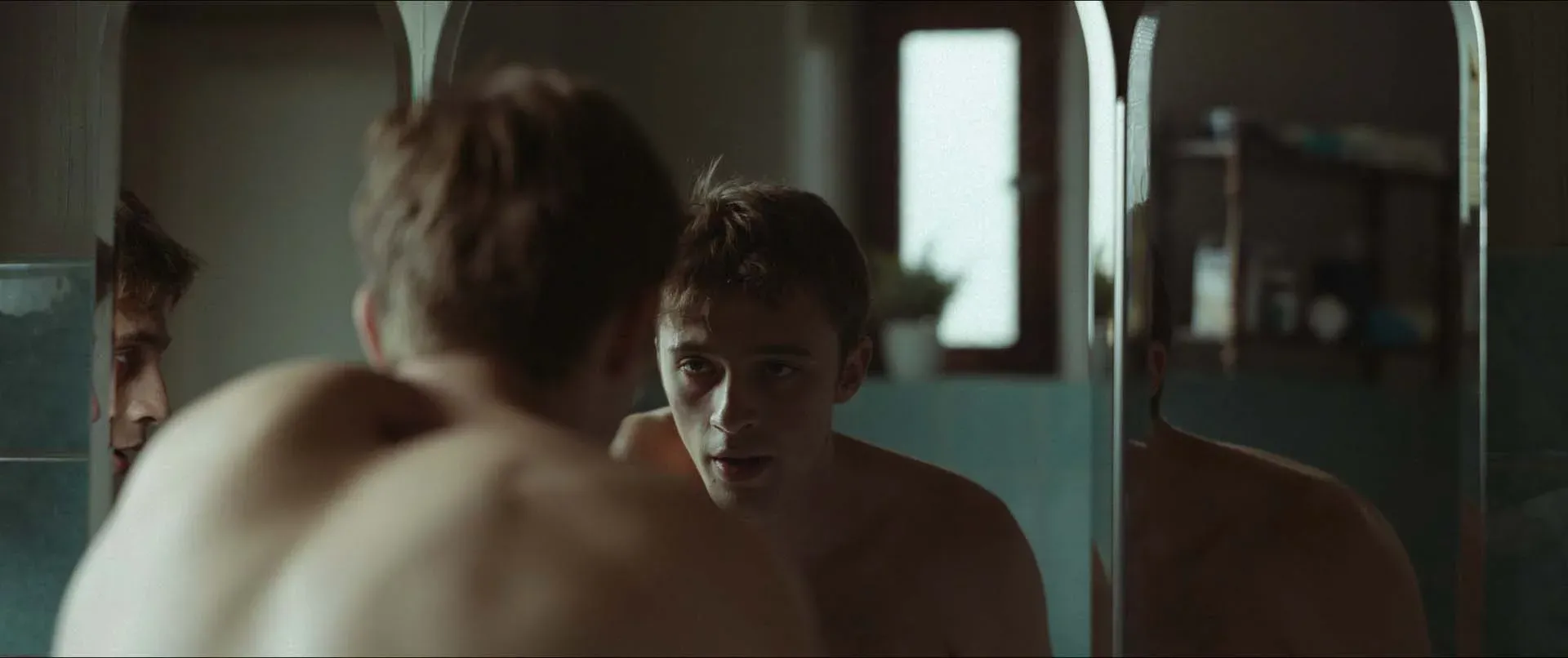Set in a small town in northeastern France, The Quiet Son tells the moving story of a tight-knit family facing turmoil when the eldest son joins a radical far-right group. Directed by sisters Delphine and Muriel Coulin, the film had its world premiere at the 2021 Venice Film Festival, where it showcased the personal toll of rising political polarization.
We’re introduced to Pierre, a devoted father and railway worker, and his sons—the athletic but directionless Fus and the studious Louis. Despite tragedy in their past, the three share a strong bond. But this stability is threatened when Fus becomes involved with a gang of violent nationalists. As his beliefs grow in extremism, tensions rise with his father, a proud leftist who can’t comprehend what’s led his boy astray.
The directors handle this divisive subject with empathy rather than accusation. Through everyday scenes of the family quietly unraveling, we see how love and ideology can clash in ways that deeply hurt all involved.
Outstanding performances, particularly from Vincent Lindon as Pierre, bring nuanced humanity to characters caught in widening fault lines. By making us feel their struggle, The Quiet Son personalizes how such issues impact individuals—an approach that leaves a lasting resonance.
Understanding a Family’s Breakdown
Set in a small French town, The Quiet Son introduces us to Pierre, a devoted father raising sons Fus and Louis alone after their mother’s passing. Though different, the three share a close bond. But trouble arises when Fus gets drawn to the local far-right group following a soccer win.
As Fus grows closer to the radicals, tensions emerge between him and his father Pierre, a proud leftist. Pierre sees their dangerous ideologies as threats to his family’s stability. Yet he also wants Fus to make his own choices. The film explores this heartbreaking conflict between a parent’s love and political disagreement.
We see Fus diving deeper into the extremist world, angered by the lack of opportunity in their struggling town. But Pierre clings to the job of keeping their region’s infrastructure running, representing its fading industrial past. Scenes of Pierre finding Fus among militant fascist drills drive their rift wider.
The directors chronicle the family’s tragic unraveling through subtle scenes of their daily lives gradually changing. Strong performances, particularly from Vincent Lindon as Pierre, bring nuance to characters facing ideological divisions, splitting what they cherish most. By the end, Fus has drifted so far that his actions have painfully personal consequences.
The film handles the sensitive topic with care. While not delving into political commentary, it personalizes extremism’s human costs and the difficult questions of how—or if—a caring father can save a radicalizing child from themselves. Its intimate examination leaves dark issues feeling personal, resonant, and hard to dismiss.
Understanding Complex Characters
This film succeeds so greatly due to its compelling characters, brought to life through nuanced performances.
Vincent Lindon shines as Pierre, the devoted father struggling to understand why his boy slipped away. Lindon captures all the fleeting emotions—grief, anger, desperation—of a man watching his world fracture while still offering unconditional love.
Opposite Pierre is Fus, played brilliantly by Benjamin Voisin. Fus is full of contradictions, charming one moment and volatile the next. Voisin departs, making him a person, not just a polarized figure, letting us see how extremism seduces the vulnerable.
Stefan Crepon also excels as Louis, the familial hope Pierre and Fus now live through. With sensitivity, Crepon shows Louis torn by what’s pulling his family apart yet bonding him to both.
Together, the actors bring an empathetic humanity to people grappling with ideological divisions far beyond their control. Their nuanced work imbues complex themes with rich emotional resonance. We understand characters formerly unfamiliar, showing how extremism impacts individuals—and families—we may know ourselves. This grounded intimacy is key to the film’s lingering impact.
Understanding Extremism Through Intimate Portrayal
Sisters Delphine and Muriel Coulin guide this film with a potent intimacy. They don’t sensationalize its difficult subject but render it through mundane moments, unveiling deep transformations.
The directors observe their characters’ daily routines, letting relationship shifts emerge naturally. Scenes simply showing this family’s tender bonds deepen the later anguish of seeing cracks form. Without heavy dialogue, their direction tells profound stories.
Cinematographer Frédéric Noirhomme supports the vision through candid imagery. His camera neither romanticizes nor passes judgment, simply documenting. Dark realities surface through contrasting the comforting familiarity of home against jarring glimpses of fascism’s alluring threat.
Noirhomme’s lens embraces the unvarnished truth of this struggling town. Just as the characters grapple with harsh complexities beyond control, his shots presented unadorned ground harsh issues in everyday lives.
Together, their unshowy yet vivid visual storytelling anchors this volatile topic in the human experiences we’ve known. Whereas sensational spreads might spark fleeting interest, this intimate portrayal lingers by making divided families feel within our embrace. Their restrained, empathetic power helps us comprehend how extremism worms into ordinary lives and loved ones whom we’dsave.
Speaking to Today’s Divisions
By anchoring difficult issues in one family’s struggle, this film travels beyond its rural French setting. When first released, The Quiet Son commented deeply on its home country’s political climate. But it makes truths that feel freshly pertinent.
The rise of far-right thinking presented mirrors real radicalization challenging many places. Through the private prism of loved ones divided, the movie paints what fuels these dangerous surges among certain left-behind groups.
Its tender portraits drive home extremism’s human costs better than polemic ever could. We share this family’s anguish as ideological rifts emerge from within what they cherish. In showing life torn past repair, the directors personalize heavy themes.
This intimate approach resonates strongly. Where sensationalism flees the mind, felt stories linger. We recognize pieces of our world in their struggling town left with few opportunities. Fractures emerge more meaningful in a mirror of relatable lives, not lectures.
Today, when discord again challenges many nations, the film feels wrenchingly current. Its lessons of empathy over accusation feel vital. By humanizing divides most politicize, it helps bridge gaps some exploit for gains rather than remedy.
Through one example, The Quiet Son speaks powerfully to the dynamics driving communities apart worldwide. Its compassion reminds us a shared humanity exists beneath surface differences, too easily made weapons against “others.”.
Rendering Divisions Human
The Quiet Son leaves a lasting impact by telling an intensely human story about tensions so easily made abstract. Through lived experience rather than statistics, it brings extremism’s fallout into clear focus.
The directors draw us in with understated yet vivid glimpses into a family’s gradual fracturing. Superb performances, especially from Lindon as the father watching helplessly, breathe life into characters torn by divides beyond their management.
It personalizes heavy themes by filtering them through private turmoil between those who should be closest. In doing so, the film grounds divisive issues in emotional realism that resonates where facts fade. Its empathetic lens makes ideological upheaval feel within our own families.
While some desired deeper commentary, most recognized its choice to show overtell through intimate portrayal instead of accusation. By making divisions human rather than political, its exploration encourages understanding over further polarization.
Even as societies grow ever more fractured, The Quiet Son’s lessons of shared humanity beneath surface differences maintain relevance. Its compassionate examination serves as a thoughtful look into how extremism impacts individuals and the ones who wish to save them.
The Review
The Quiet Son
In tender yet unvarnished prose, The Quiet Son brings ideological strife home by routing it through the private upheaval of a shattering family. Outstanding performances animate characters grappling with divides beyond repair, personalizing complex issues in a way facts cannot. While some desire deeper analysis, most agree its choice to feel over lecture, show over tell through empathetic portrayal effectively communicates how extremism impacts individuals. The Quiet Son resonates through intimate examination of what tears loved ones apart, a perspective that feels all the more valuable as societies grow divided.
PROS
- Sensitive and subtle direction explores a difficult topic empathetically through a personal lens
- Nuanced characterization anchored by outstanding performances, especially Vincent Lindon
- Examines extremism's human toll in a grounded, resonant manner by dramatizing fractures in an ordinary family.
- Encourages understanding over accusation by personalizing political divisions
CONS
- Narrow focus on one family's struggles means broader societal context is not deeply analyzed.
- Some found its realistic style lacking in emotional climax or inspiration at times.



















































Discussion about this post